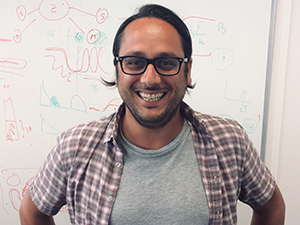Combination immunotherapy treatment significantly improves disease-free survival following surgery in patients with the most common type of kidney cancer, according to new research.
Results from the Phase III RAMPART trial were presented at the European Society for Medical Oncology (ESMO) congress 2025 by Professor James Larkin, Professor in the Division of Clinical Studies at The Institute of Cancer Research, London and a Consultant Medical Oncologist at The Royal Marsden NHS Foundation Trust.
These results are the first reported data from RAMPART, a trial designed to assess whether immunotherapy can prevent recurrence of disease in patients with early-stage kidney cancer who have undergone surgery with the aim of a cure.
The trial investigated whether treatment with durvalumab alone or in combination with tremelimumab after surgery could prevent recurrence of renal cell carcinoma (RCC), the most common type of kidney cancer.
Patients were randomly assigned to one of three groups, active monitoring following surgery, durvalumab alone for one year, or durvalumab plus tremelimumab, with the combination given during the first two cycles only. Results comparing the durvalumab alone arm of the trial to active monitoring are expected in the future.
The drug combination works by helping the immune system find and destroy cancer cells
Durvalumab and tremelimumab are immune checkpoint inhibitors, a type of targeted immunotherapy. These drugs work by helping the immune system find and destroy cancer cells as they spread.
Using durvalumab and tremelimumab together can produce a stronger immune response by blocking two different checkpoints. Together they increase the number of cancer-fighting T cells and prolong their activity at the tumour site, leading to a stronger and more sustained anti-tumour immune response.
At three years, disease-free survival was 81 per cent in the group receiving durvalumab and tremelimumab, compared with 73 per cent in the active monitoring group, who were on no active treatment but regularly monitored to compare outcomes against the group receiving immunotherapy.
Patients at higher risk of relapse saw the greatest benefit
The greatest benefit was observed among the group of patients at higher risk of relapse. In this subgroup, three-year disease-free survival was 78 per cent with combination treatment versus 61 per cent with active monitoring. The patients were deemed to be at high risk of the disease recurring based on several different factors, such as the stage of the cancer at diagnosis, whether the cancer has spread to nearby lymph nodes and the size of the primary tumour.
Safety findings were consistent with the known profiles of durvalumab and tremelimumab and other immune checkpoint inhibitors.
The benefit observed with combination treatment offers new hope to patients most at risk of their cancer returning.
The study involved 790 patients recruited across 80 sites worldwide between October 2018 and June 2023 and was led by the Medical Research Council (MRC) Clinical Trials Unit at University College London (MRC CTU at UCL).
‘We saw a remarkable result, with over a 43 per cent relative reduction in the risk of recurrence’
Professor James Larkin, Consultant Medical Oncologist at The Royal Marsden NHS Foundation Trust and Professor in the Division of Clinical Studies at The Institute of Cancer Research, London, and Chief Investigator of the RAMPART study, said:
“In a subgroup of patients facing a high risk of cancer returning after surgery, we saw a remarkable result, with over a 43 per cent relative reduction in the risk of recurrence. These are very promising findings that confirm the benefit of immunotherapy in the treatment of high-risk renal cell carcinoma.”
Professor Angela Meade, one of the leads of the international RAMPART trial who is based at the MRC Clinical Trials Unit at UCL, said:
“We are very pleased to see that this combination of immunotherapy drugs significantly reduces the risk of kidney cancer returning. Importantly, the greatest benefit was observed in participants who were at the highest risk of recurrence. As these treatments can cause serious side effects, it is important that we target their use to those most likely to benefit.”
‘I’ve been in remission ever since joining the trial’
Janet Middlehurst, 69, a retired teacher from London, was diagnosed with Stage 3 kidney cancer in August 2019.
Following surgery to remove her kidney she joined the RAMPART trial at The Royal Marsden NHS Foundation Trust and received the combination immunotherapy treatment. She said:
“When I was diagnosed I didn’t even know if I’d see Christmas, so every day is a bonus, and I feel very lucky.
“I’ve been in remission ever since joining the trial so it’s amazing to be on the other side. I’ve been able to spend time with my grandchildren and I’ll see my youngest son get married next year.”
Immunotherapy research at The Royal Marsden is supported by The Royal Marsden Cancer Charity, including through providing funding for the West Wing Clinical Research Centre which supports many trials, including The RAMPART trial.
The RAMPART trial was sponsored by UCL. This study was conducted with financial support from AstraZeneca UK Limited.
.tmb-propic-md.jpg?Culture=en&sfvrsn=c25d2b2f_9)
 .
.
